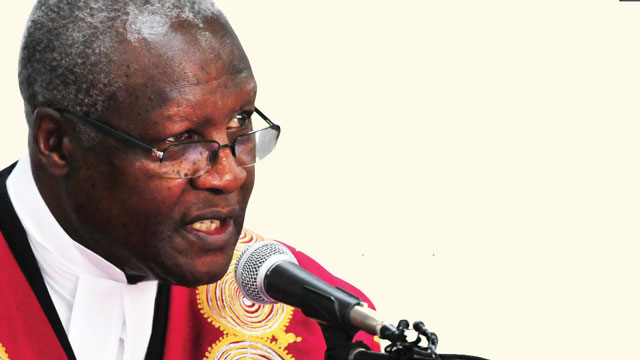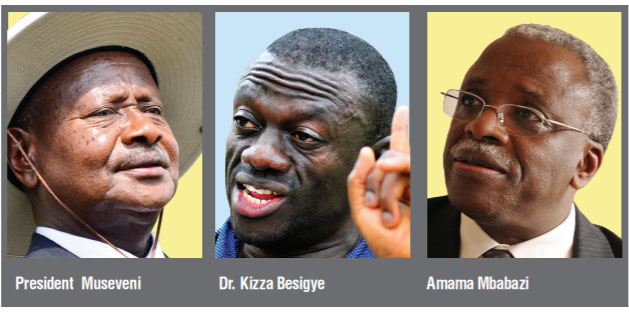
ANALYSIS: Kenya Supreme Court annulment of election reignites debate over Uganda ruling
Kampala, Uganda | HAGGAI MATSIKO | On the evening of Sept.4, in the boardroom of his offices on Plot 103, Buganda Road, Mohmed Mbabazi, the lead lawyer in the 2016 Amama Mbabazi presidential elections petition, appeared like he was back in court.
He was not wearing his lawyer’s robes and he was not before judges but the same loads of books and files that were piled before him when he argued the case, were spread across his long boardroom table. All of them were about presidential petitions.
With the same vigor he exhibited in court both in the 2001 and 2016 petitions, Mbabazi flipped through the files as he marked out lines in the huge file of the ruling of the Chief Justice Bart Katureebe-led bench, which unanimously dismissed his petition.
Mbabazi appeared to be having the last laugh as he contrasted Kenya’s Sept.1 Supreme Court ruling that annulled the re-election of President Uhuru Kenyatta and that of Uganda’s that last year upheld the victory of President Yoweri Museveni.
The Kenyan ruling, which will see East Africa’s biggest economy go back to polls within 60 days, followed a petition by Kenya’s National Super Alliance (NASA) led by Raila Odinga.
Four justices ruled in NASA’s favour, two dissented and one was unwell and didn’t vote. The majority were; Chief Justice, David Maraga, his Deputy, Philomena Mwilu, Smokin Wanjala, and Isaac Lenaola. The dissenters were Jackton Ojwang’ and Njoki Ndungu. Justice Mohammed Ibrahim missed the vote.
The ruling has piqued the interest of many because it is unprecedented in the whole of Africa and is expected to have major implications on how future presidential election petitions are determined.
In Uganda, specifically, the ruling has sparked debate about judicial independence and got many drawing parallels between the Kenyan Supreme Court and Uganda’s. Uganda’s Supreme Court has on three occasions upheld the re-election of President Yoweri Museveni and against his opponents even when they have presented evidence of irregularities and gross violation of electoral laws.

The most recent petition was brought before court in March by former Prime Minister Amama Mbabazi after the Electoral Commission announced President Yoweri Museveni as the winner with 61 percent of the vote cast on Feb.18. All the nine Justices of Supreme Court voted against it and upheld President Museveni’s victory.
Amama Mbabazi who chose to petition the result had only managed 1.4 percent of the vote. This was mainly because the flag bearer of Uganda’s biggest opposition political party—FDC—and Museveni’s four time challenger, Col. Kizza Besigye had pledged not to challenge the results before the court and did not as he was locked up in virtual house arrest. Many saw Besigye’s rejection as a major vote of no confidence in the Supreme Court.
Besigye’s lack of confidence in the courts stemmed from their verdicts on two consecutive times—2001 and 2006 elections.
In both cases, the court ruled that although there were violations of the constitution and electoral laws, these were not substantial enough to alter the result.
Mohmed Mbabazi was a key player in both the 2001 and 2016 petitions—in both of them on as the petitioner’s lawyer.
It is no surprise, therefore, that Mbabazi now finds himself the archetypical proponent of Kenya’s Chief Justice Maraga ruling. The decision has sharply divided opinion with critics saying the ruling has subverted the will of the people. But many are hailing the ruling as precedent-setting and a giant step for democracy in Africa.
Mbabazi is one of those that have already converted into disciples of Justice Maraga, the man hailed for the popular ruling that has sent shockwaves across the world.
In his boardroom, the first thing he did as the interview for this story started, was quote Justice Maraga; “The greatness of a nation lies in its fidelity to its constitution and its strict adherence to the rule of law, and above all, the fear of God”. Maraga made the statement shortly before reading his decision.
Then he launched into his own analysis. “In Kenya the judges feared God and not Kenyatta,” Mbabazi told The Independent, “In Uganda the judges feared Museveni and not God. That is why they failed to apply the law like their counterparts in Kenya.”
In March last year, the Mbabazi jumped several huddles and went to great lengths to convince the nine Supreme Court justices that non-conformity to the laws and other electoral offences were enough for annulment of an election, albeit in vain.
“They were hell-bent on dismissing the petition,” he said, “that is why even when they found evidence of non-conformity with the laws; found evidence of gross incompetence and inefficiency on the part of EC, they still dismissed the petition.”
But for Ellison Karuhanga, who was on the defence team, while Kenya’s ruling “was a momentous decision”, interpretation and analysis of what it means for other jurisdictions like Uganda can only be made after the details of the ruling are made public.
“We haven’t seen many of those globally,” he said, “There may be three or four all over the world. It is definitely the first in the region and on the continent. As to whether it is precedent-setting, will depend on the details of the ruling.”
Karuhanga noted that without the details, not much can be said about the decision.
“The only criticism at this point is that while the dissenters gave us the summary of the reasons behind their decision,” Karuhanga said, “The majority didn’t. And that is why you see this vacuum with everyone interpreting the decision their way.”
 The Independent Uganda: You get the Truth we Pay the Price
The Independent Uganda: You get the Truth we Pay the Price




aaa美好的一天aaa